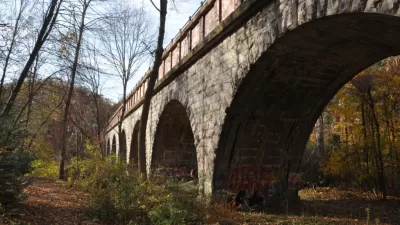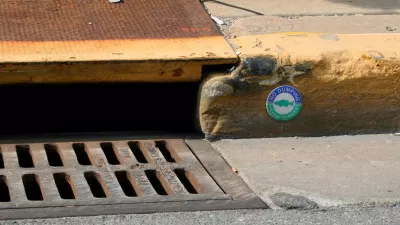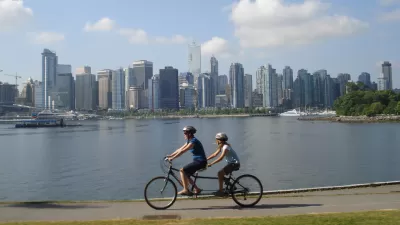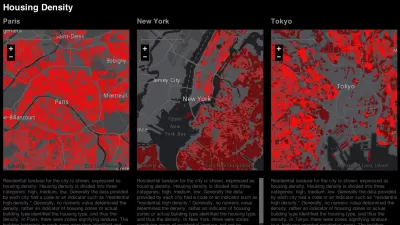Infrastructure

Trail Conversion Exposes Boston Area's Hidden Infrastructure
Where the Boston area's water supply once gushed, pedestrians and bikes will now flow thanks to a plan to repurpose the Massachusetts Water Resources Authority's aqueducts as public spaces.

The High Cost of Free Curb and Gutter
The U.S. is in need of new approaches to managing stormwater. Though the EPA has been slow to provide guidance, there's plenty that can be done now. Parking reform provides a handy model for solving seemingly intractable entitlement problems.
China Plans World's Most Extreme Underwater Tunnel
At 76 miles, the tunnel China may soon start constructing beneath the Bohai Sea to connect the port cities of Dalian and Yantai would be longer than the world’s two longest underwater tunnels combined and cost $42.4 billion to complete.
Will Car-Sharing Apps Unclutter L.A.'s Roadways?
Thanks to mobile technology, Los Angelenos no longer have to choose between driving their own cars and paying expensive cab fares after a night out on the town.
Foxx's First Goal: Find the Money!
Keith Laing, with help from Josh Schank of the Eno Center for Transportation, describes the reality facing the new Secretary of the Department of Transportation. With gas tax revenue dwindling and MAP-21 expiring next year, securing funds is crucial.

Insider Advice on How Best to Bike Your City
With bike use exploding across North America, The New York Times has asked its readers to submit their suggestions for how best to navigate their city streets on two wheels. Covering 16 cities, the project has received 4,614 comments to date.
The Revolution Transforming America's Strained Water Systems
In the first in a series of articles exploring 'infrastructure solutions for the next generation', Cynthia Barnett examines the creative ways that communities are solving the problems caused by old and overtaxed water systems.
Climate-Caused Blackouts Ahead, Warns DOE
John M. Broder writes about a new U.S. Department of Energy report released July 11th that details the vulnerability of the nation's entire energy system to climate change effects - from droughts, intense storms, rising seas, lower river levels...
Big Plans for Bike Parking Take Shape
We've recently looked at the shortage of bike parking plaguing cities like Amsterdam. Designers are on the case, inventing 'ingenious ideas' for parking all those bikes. Ben Schiller looks at five of the best.
Water Crisis: Challenges Ahead in New Mexico
While much of America’s southwest and inter-mountain west battles blazing forest fires, Magdalena, NM faces a less spectacular but equally fearsome crisis: a municipal system no longer capable of delivering water to the village's 938 residents.

New Tool Facilitates Stunning City Comparisons
The creator of the TED conference has teamed up with Esri to develop an innovative interactive exhibit and online mapping tool to compare 16 global cities along 16 data points, including: population density, open space, and traffic.
Safeguarding New York's Most Vulnerable Neighborhood
While Staten Island and Rockaway, Queens also suffered devastation from Superstorm Sandy; Broad Channel, an island in Jamaica Bay, Queens, may be the lowest lying area in the City and endures tidal flooding regularly, not just from storm surges.
Complete Streets Policies: Easy to Adopt and Easy to Ignore
More and more local governments are adopting complete streets policies. But gaps in implementation in these places suggests that the building of actual complete streets is dependent on a true culture shift. Angie Schmitt looks at the obstacles.
D.C.'s Gridlock Has Improved; What Can Be Done to Sustain Recent Gains?
Recent studies report a noted decrease in traffic congestion in the D.C. area. Robert McCartney credits two trends and asks how the area should spend additional transportation revenues that will be generated by recent tax increases.
Mobile Oasis Brings Healthy Options to Manhattan Food Deserts
Access to affordable healthy food is a problem in poor communities throughout the U.S. Manhattan Borough President Scott Stringer and a local non-profit have developed one way to quickly boost the healthy food infrastructure in food deserts.
Is Walkability a Universal Human Right?
An Indian newspaper has started a campaign aimed at making Chennai more accommodating to pedestrians. The issue is particularly acute in the global South, as growing auto ownership threatens the safety of those yet to climb the economic ladder.
Despite Lean Budgets, European Transit Goes Green
Despite widespread budget woes and austerity programs, European cities are pushing forward with plans to reduce greenhouse gas emissions by retrofitting existing transit systems in a "slow-motion revolution" in electric transport, reports Erica Gies.
Wash. Gas Tax Legislation Fails in Senate, Killing Columbia River Crossings
Wash. state senate Republicans dealt a crushing blow to governors of both Wash. and Ore. by killing a 10.5-cent gas tax bill needed to tap $850 million in federal funds to finance rebuilding of two, obsolete I-5 spans over the Columbia River.
A No-Brainer: Taichung Recognized as Intelligent Community of the Year
Taichung, Taiwan (pop 2.7 million) has beaten out six other finalists to claim the Intelligent Community Forum’s (ICF) designation as "intelligent community of the year". Robert Bell and Sylvie Albert describe what makes the city an intelligent icon.
BART Strike Provides Lessons for Creating a Resilient Bay Area
As news reports indicate, the recent BART strike made a mess out of the Bay Area's morning and evening commutes. For planning think tank SPUR, it has helped to illustrate significant gaps in the region's transportation infrastructure.
Pagination
Urban Design for Planners 1: Software Tools
This six-course series explores essential urban design concepts using open source software and equips planners with the tools they need to participate fully in the urban design process.
Planning for Universal Design
Learn the tools for implementing Universal Design in planning regulations.
Gallatin County Department of Planning & Community Development
Heyer Gruel & Associates PA
JM Goldson LLC
City of Camden Redevelopment Agency
City of Astoria
Transportation Research & Education Center (TREC) at Portland State University
Jefferson Parish Government
Camden Redevelopment Agency
City of Claremont


































